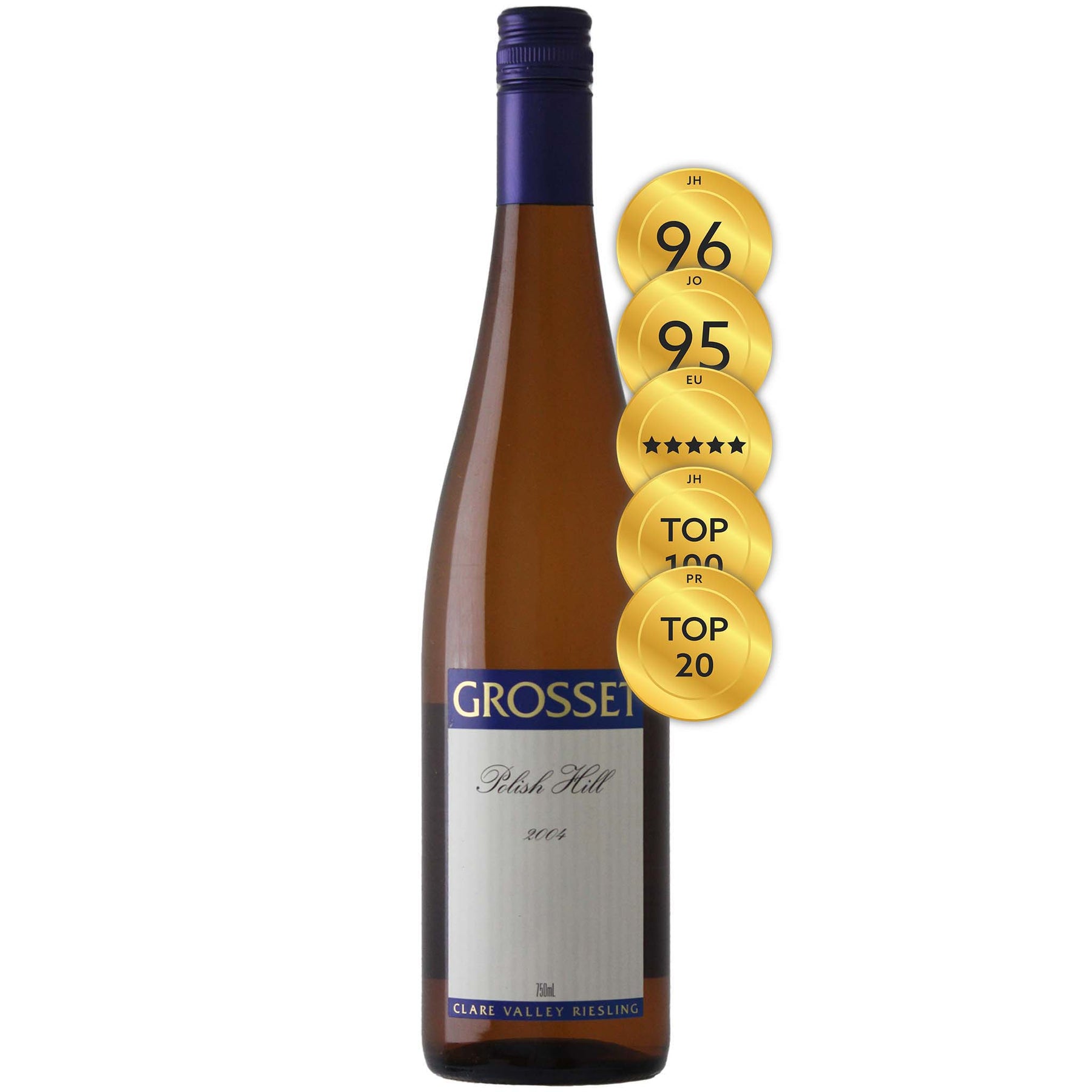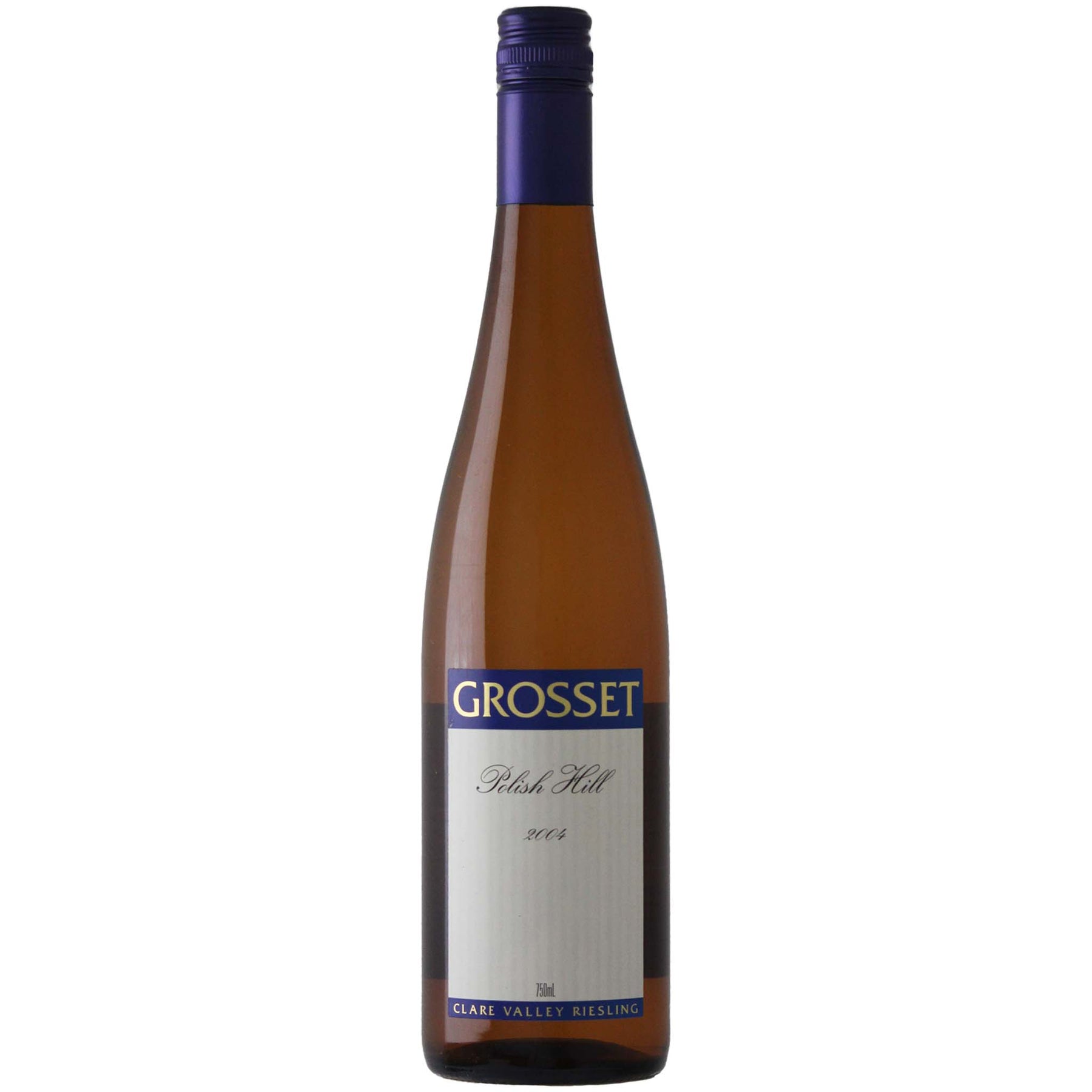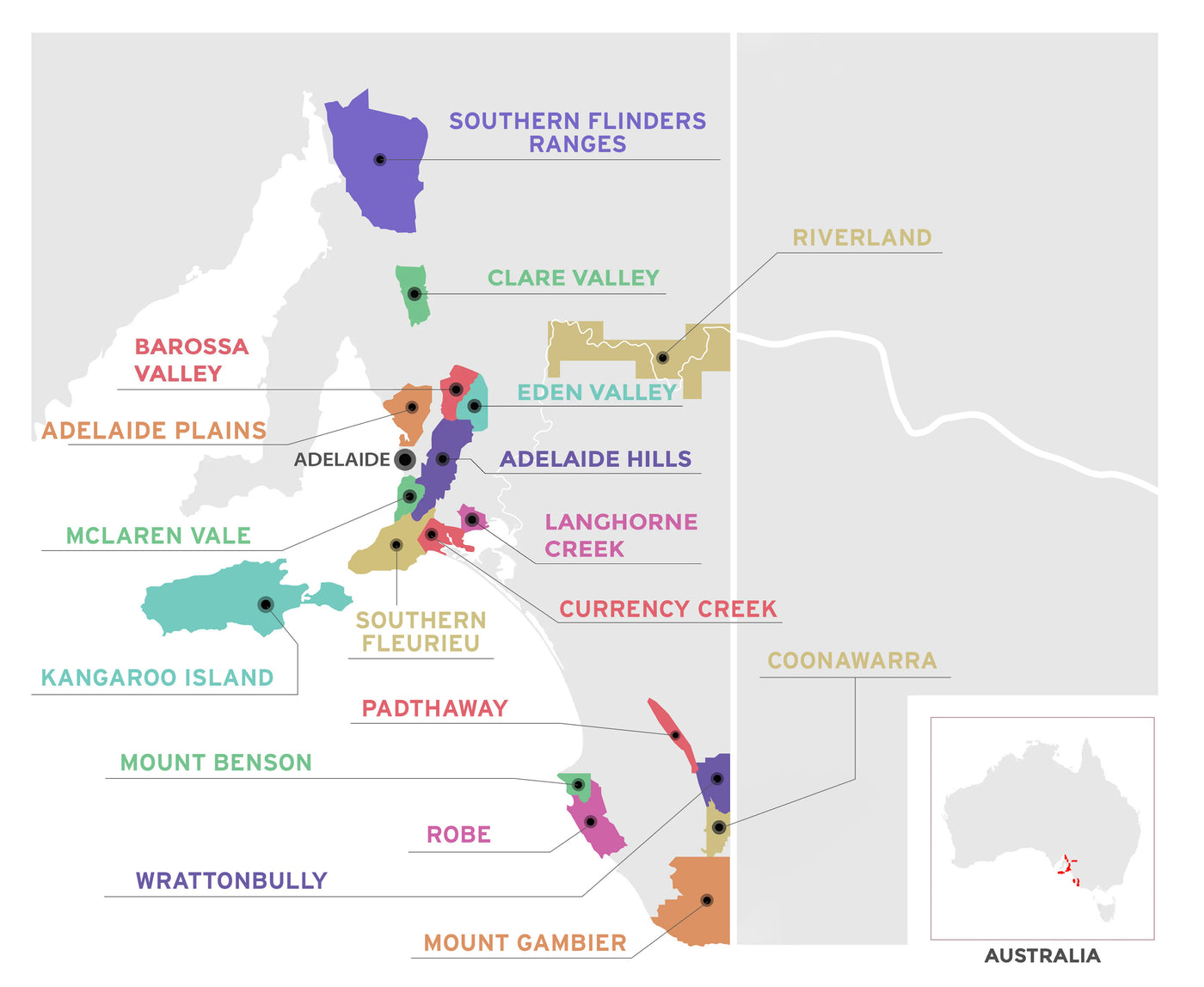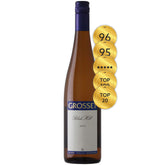

Grosset Polish Hill Riesling 2004
Style: White Wine
Variety: Riesling
Closure: Screwcap
Grosset Polish Hill Riesling 2004
Warehouse
34 Redland Drive
Vermont VIC 3133
Australia
Critic Score: 96 and ★★★★★
Alcohol: 13.0%
Size: 750 ml
Drink by: Now
James Halliday Top 100 for 2004
Philip Rich Top 20 Wines of 2005
"This long-lived beautifully aromatic and concentrated wine does much to define great Clare Valley Riesling." Andrew Caillard MW
The Grosset Polish Hill Riesling is arguably Australia's best Riesling and one of the New World's greatest Rieslings. For many years it has been a benchmark wine for the Clare Valley. The wine possesses wonderful perfume, incredible fruit purity and intensity of flavour, has great finesse and ages spectacularly. The first vintage of the Grosset Polish Hill Riesling was produced in 1981. Langton's classifies Grosset Polish Hill Riesling as 'Exceptional'. Only 17 wines in total make this grade, of which only 3 are white wines.
"Indulge yourself. Australia's best riesling? There's lots of competition for the title, but Jeff Grosset's Clare Valley wine has to be a contender. The '04 is still a pup, slightly gassy, green-tinged and intense with lots of aromatic interest in the floral and spicy direction. The rich, round palate has superb integration of acidity and full body, with a clean, long, fine aftertaste." Epicure Uncorked
"The 2004 Grosset Polish Hill is comparable in quality terms with the two most recent vintages of the wine although it resembles the 2003 in profile more than the 2002. Characteristically closed at present yet with hints of lime zest and savoury minerally aromas, it is intensely flavoured with pristine, freshly squeezed lime juice flavours before a long, distinctively lingering, dry finish. The 2004 Polish Hill has that characteristic lean, steely, tight structure, immense power, weight and persistence which suggests that it is built for the long haul." Grosset
Expert reviews
"Often slower to open up than its Watervale counterpart, this year the roles seem to be reversed, but without compromising the cellaring potential of this wine. Potent lime and apple blossom aromas flow through into the palate, where flecks of herb and slate add to the complexity of the long finish. Drink: Now-2014." James Halliday, Halliday Wine Companion - 96 points and Top 100 Wines of 2004
"A restrained fragrance of mineral, wet stones and fresh flowers overlies a leesy, citrusy perfume that becomes more intense with time in the glass. Supple and silky, it's smooth and brightly flavoured, before finishing taut and steely. Slightly riper than usual, its long palate of pristine but slightly candied fruit is punctuated by a clean, bracing cut of austere, but racy acidity. Drink 2012-2016+." Jeremy Oliver - 95 points
"While both the Gaia Cabernet 2002 – this is close to the best Grosset Cabernet yet and is well worth tracking down – and Watervale Riesling could have made my Top 20, it is the Polish Hill Riesling which really blew me away this year. This intense, focused, minerally and dry wine has wonderful purity of fruit as well as its trademark structure and backbone, ensuring that it will still be looking fresh in another ten years' time." Philip Rich, The Australian Financial Review Magazine – Top 20 Wines of 2005
"Indulge yourself. Australia's best riesling? There's lots of competition for the title, but Jeff Grosset's Clare Valley wine has to be a contender. The '04 is still a pup, slightly gassy, green-tinged and intense with lots of aromatic interest in the floral and spicy direction. The rich, round palate has superb integration of acidity and full body, with a clean, long, fine aftertaste." Epicure Uncorked ★★★★★
Awards
James Halliday Top 100 for 2004
Philip Rich Top 20 Wines of 2005
Polish hill vineyard
The Grosset Polish Hill Vineyard is an eight‑hectare, organically certified vineyard in the Clare Valley. The vineyard is named after the nearby Hill River Settlement established by Polish immigrants in the 1840s. The vineyard is relatively close-planted and comprises three clones of Riesling, two German and one rare local clone, and produces an average of just two bottles of wine per vine.
Located on a hard rock site at an elevation of 460-480 metres, the gently sloping vineyard sits on silt and shallow shales over a thin crust of clay and gravel, on top of a bed of blue slate estimated to be 500 million years old. The vines struggle to draw nutrients from the soil, so the bunches and berries are small and thick skinned. This vineyard exemplifies how old-rock profiles can contribute to a wine's character.
The vines are dry-grown on a modified ballerina trellising system, and completely hand tended and organically farmed. A major challenge of this site is the variability in vigour from one vine to the next. This demands more intense labour input and hand-tending skill – varied to suit each vine – to achieve balanced vine growth and even fruit ripening. Vintage takes place in early April, normally a few weeks later than the Springvale Vineyard in Watervale.
"The Grosset Polish Hill Riesling has incredible perfume and fruit purity, the lime/floral fruit profile balanced by a fine cut of acidity. This long-lived beautifully aromatic and concentrated wine does much to define great Clare Valley Riesling." Andrew Caillard MW

The four Grosset estate-owned vineyards
About Jeffrey Grosset

"Jeffrey Grosset wears the unchallenged mantle of Australia's foremost riesling maker. Grosset's pre-eminence is recognised both domestically and internationally." James Halliday
Grosset was 15 when his father, an electrician, came home with a bottle of wine and shared it with the family. It was riesling and Jeffrey was gobsmacked. So began the Grosset story. The following year Jeffrey enrolled at Roseworthy Agricultural College, completing an Agriculture degree in 1973 and an Oenology degree in 1975. At the age of 21 Jeffrey started work at Seppelt Great Western, before heading to a German winery with a 1000-tonne crush as assistant winemaker, only to find the chosen French winemaker had changed his mind, leaving Grosset in charge. He subsequently returned to Australia and worked at Lindeman's Karadoc winery with its 30,000-tonne crush. But ultimately he wanted to start his own label.
In 1981 Jeffrey purchased an old milk depot in the historic township of Auburn 1981 and established Grosset Wines. He produced four wines that vintage under his own label, 800 dozen bottles in total. Now, 42 years later, Grosset is regarded as arguably the best maker of riesling in Australia and produces nine wines and 11,000 bottles per vintage.
Grosset is not shy about challenging tradition and questioning accepted practices. In the late 1980s, he was the leader of a successful movement to only allow the use of the word Riesling on Australian wines that were made specifically from the Riesling grape. Until that point, a significant number of Australian wines with Riesling on their label were made from other grape varieties.
Grosset was also the driving force behind a decision in 2000 by Clare Valley Riesling producers to switch to screwcap closures for their wines and to encourage Australian and New Zealand winemakers to do the same, and for the public, retailers and media to embrace the change. He continues to privately fund research into the subject.
Next, he established the Grosset Gaia Fund, donating to charities supporting youth, the arts and the environment. Recently he has led the way for Australian winemakers to use blockchain technology for verification of product provenance, authenticity and seal integrity.
Jeffrey Grosset has received a great deal of local and international recognition for his winemaking. In 1998, he was the first recipient of "Australian Winemaker of the Year" from Gourmet Traveller Wine magazine and was named the "International Riesling Winemaker of the Year" at the Riesling Summit in Hamburg, Germany. He was nominated in 2005 as one of the world's "50 Most Influential Winemakers" by Wine & Spirits and in 2006, named as one of the "Top 10 White Winemakers" in the world by Decanter magazine.
Grosset's philosophy has remained steadfast over the years, the emphasis is on purity of fruit. The estate vineyards, which are ACO certified organic, are hand-tended and each bunch of grapes is harvested at optimum ripeness. The winemaking process is gentle and uncomplicated. With dedication, discipline and the application of knowledge garnered through decades of experience, the result is the finest expression of variety and place.

South Australia
South Australian is responsible for more than half the production of all Australian wine. It is home to more than 900 wineries across 18 wine regions. The regions are Adelaide Hills, Adelaide Plains, Barossa Valley, Clare Valley, Coonawarra, Currency Creek, Eden Valley, Kangaroo Island, Langhorne Creek, McLaren Vale, Mount Benson, Mount Gambier, Padthaway, Riverland, Robe, Southern Fleurieu, Southern Flinders Ranges and Wrattonbully.
Many of the well-known names in the South Australian wine industry established their first vineyards in the late 1830s and early 1840s. The first vines in McLaren Vale were planted at Reynella in 1839 and Penfold's established Magill Estate on the outskirts of Adelaide in 1844.
South Australia has a vast diversity in geography and climate which allows the State to be able to produce a range of grape varieties - from cool climate Riesling in the Clare and Eden Vallies to the big, full bodied Shiraz wines of the Barossa Valley and McLaren Vale. Two of Australia's best-known wines, Penfolds Grange and Henschke Hill of Grace, are produced here. There is much to discover in South Australia for the wine lover.


